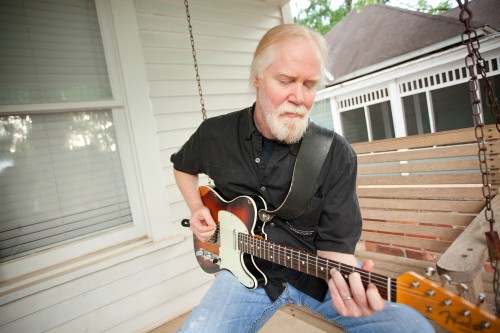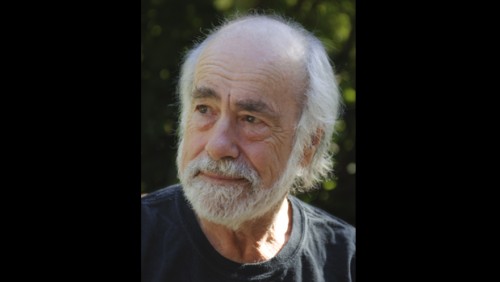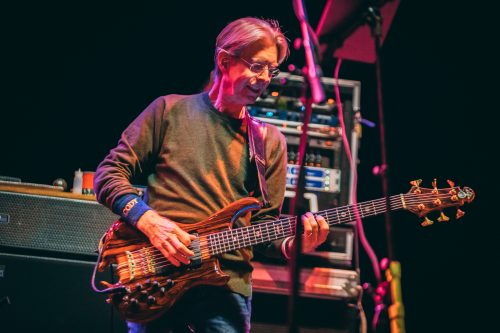By Michael Lello
Listen to Jimmy Herring play just a few licks on his guitar, and you’ll know he’s one the best there is at what he does. Some pretty famous musicians agree with you on that. The affable Georgian, a member of Widespread Panic since the mid-2000s, has also done stints in post-Grateful Dead bands The Other Ones, Phil Lesh & Friends and Jazz Is Dead, as well as a tour filling the Allman Brothers Band guitar slot left vacant after the dismissal of Dickey Betts. Not to mention his heady days in Col. Bruce Hampton’s Aquarium Rescue Unit.
For his latest project, Herring has surrounded himself with premier talent yet again in The Ringers, which also feature fellow guitarists Wayne Krantz, who has played with Steely Dan, among others, and Michael Landau, who has played with everyone from Miles Davis to Joni Mitchell to James Taylor to Michael Jackson. Rounding out the lineup are bassist Etienne Mbappe, a member of Mahavishnu Orchestra legend John McLaughlin’s band, and Keith Carlock who has worked with the likes of Sting, John Mayer and Donald Fagen. (He’s currently off the road awaiting the birth of a child).
With The Ringers scheduled to hit the River Street Jazz Café on Sunday, Feb. 9, we recently chatted with Herring about the origins of the new band, a recent tribute to Gregg Allman, his revisiting of a classic Phil & Friends lineup and settling into the lead guitar role in Widespread Panic.
H81R: How did The Ringers come together?
JH: My friend Souvik Dutta, who runs Abstract Logix, he had the idea. We were on tour with a different band and he asked me if I would be into playing with Wayne Krantz and Mike Landau. And I just started laughing, like, yeah right, like those guys would wanna do that. I mean those guys are hardworking musicians who are mostly known for doing trio stuff, where they get all this room to play. Why would they want to be in a band with three guitar players, is what my thinking was. Well, he went to them and asked them if they’d be into it, and they said yes. I thought he was sorta pulling my leg, but it turns out he wasn’t. And then Etienne Mbappe on bass is somebody who we’ve admired for a very long time, he’s been playing with John McLaughlin, Bill Evans, Robben Ford, he’s played with a lot of people, and the chance to get to play with him we jumped at as well. And then there was Keith Carlock who’s just absolutely incredible, someone I always loved and hoped I could work with someday. However, his wife’s having a baby, so we’re getting to work with Gary Novak who’s another guy I always admired. I was thrilled that if Keith couldn’t be there that it would be Gary that would be there.
 H81R: With three guitarists in the lineup, has it been difficult for each of you to find room to play without stepping on each other’s toes?
H81R: With three guitarists in the lineup, has it been difficult for each of you to find room to play without stepping on each other’s toes?
JH: Well, it’s different things at different times. Sometimes it’s like three different trios. Like it’ll be a trio with Wayne and bass and drums, and sometimes it’s like that with Mike and bass and drums, and sometimes it’s like that with me and bass and drums. But then there’s other times when there’s interaction between other guitar players. All of us have played in several different types of musical situations so there’s never any kind of problem with the space because everybody listens and people know they can lay out or add a little bit here or there and leave room for the other musicians.
The hardest thing is finding the time to rehearse and write music together, and that’s the downside of any kind of project that isn’t a fulltime thing, is that it doesn’t get the time. The people book the shows and you have to do a lot of telephone talking or e-mailing, like “Hey, what about this song,” or “I got this song, it’s not really a song yet, but here’s a basic chart of it,” or send them a recording of the song whether it be an original or a cover. And sometimes we’re looking, really with this group, it’s not supposed to be a big heavy jazz fusion thing. We want to keep it kind of roots-oriented and keep it real simple and low-pressure because we just want to have fun.
H81R: Will you be playing any material from the bands you all have been members of?
JH: Well, I mean I don’t know if we’re consciously trying to avoid it, but we didn’t do it last time. Wayne’s got several albums, and Mike too, and they both worked with some very big people and so have the other guys, all the guys in the band worked with somebody and could be doing their songs if they wanted to, but ya know we never even talked about it. But I don’t think we’re going to try and do that. I think what we’re going to try and do is just, I know for me personally, I just want to do something different. I doubt I would want to bring the music from other bands that I’ve worked with into this particular scenario, just because it’s something different. People could expect you to do that. If you do it at all, they’re going to expect it. We are doing covers though but none of them, like Mike works with James Taylor, and we haven’t done any of James Taylor’s music, although he’s wonderful and we certainly could probably adapt some of his music to an instrumental format, we could certainly do that with Grateful Dead music or Steely Dan, Etienne’s worked with John McLaughlin, we could pull out one of his songs, but I don’t think we’re going to do that.
We’re trying to do a little bit of each person’s original music, some of Mike’s stuff, some of Wayne’s, some of Etienne’s, Keith has ideas, Gary’s got tons of ideas, but I don’t think we’ll be doing any music from bands that we’ve worked with. But we will find middle ground. Like The Meters from New Orleans, they have such a roots-oriented thing, and the beautiful thing about their music is a lot of people cover their music, and the reason is it just feels so good and it’s a great place for musicians to get to know each other because the music is simple, it’s got a killer groove, and when it comes time to solo or play, it’s a perfect jumping-off point, it’s anything-can-happen territory. And the when you’re done you have this nice song to come back to, and that’s important, because in all the incredible improvisation in the world, it just makes it more effective when you have a good song to come back to.
H81R: What was it like playing with the “classic” Phil Lesh and Friends Lineup again recently (Lesh, Herring, Warren Haynes, Rob Barraco, John Molo)?
JH: We did four shows in early December at Phil’s place, Phil has his own music venue now called Terrapin Crossroads, and it’s just a really great time. It’s a great hang. We go there, we usually rehearse for a few days, then we play four shows and it’s all in the same venue and it’s really easy and fun and it was so great to play with them again. And then Warren’s Christmas Jam came up again the next week, and we went and did that too. It’s always, always a blast playing with the original five-piece Phil Lesh and Friends that I first joined. It wasn’t my first time playing with Phil, but the first tour with different personnel. That was fun, too, but we ended up, we were a band for like five years or something. It’s like putting on an old pair of shoes to go back and play with that group. It’s fun and everyone knows each other really well. I wish we could do it more.
H81R: Phil’s stated philosophy when he started Phil and Friends was to rotate lineups, which he did, but he settled on that lineup for several years. What was it about that lineup that made everyone want to commit to it?
JH: I don’t know. I can’t speak for anyone else, but the moment we played with that particular lineup, I was praying that it stayed that lineup and that we could actually develop that by doing lots of gigs, not just one tour. I don’t know how Phil was thinking, but I just know that he seemed to be really having fun, and he’s an incredible bandleader. I mean everybody in the band loved working for him, and everybody in the band loved trying to bring his vision to a reality of what he wanted to do to the music. He has really great ideas.
I remember when Warren sat in with us, we all went to Phil and said, “Man, Phil, can we just get Warren in the band?” So when we did it full-time, I think (Phil) wanted to get him full time too. Because at the time, he said it was a rotating lineup. I had played with Phil in different groups but not a lot though. Now Barraco and Molo had played with Phil in a bunch of different lineups. They were there long before I got there. I think Warren had also played with Phil in different lineups in the past. But whenever I got there and we did a couple gigs, it was feeling incredible, it was a blast, I enjoyed it, when Warren came out and played with us, it jelled like a band. It felt like a band. And so we went to Phil and asked him what he thought, and we were begging “Let’s be a band.” And Warren wanted to do it too, because he put time into it for a long time.
 H81R: You’ve been with Widespread Panic now since 2006. How long did it take to feel like a full member of the band, and not just someone trying to fill the big shoes of the late Mike Houser?
H81R: You’ve been with Widespread Panic now since 2006. How long did it take to feel like a full member of the band, and not just someone trying to fill the big shoes of the late Mike Houser?
JH: Well ya know on one hand it felt immediately like home because they’re friends of mine and I’ve known them all since around 1989, but on another hand, Mikey not being there, he had been there from the beginning, and like you said some pretty big shoes and an amazing presence. I was in my normal feelings of just not knowing how much I should try to play like Mike would play and how much should I try to be myself. And anytime you step into a situation where somebody with a really distinctive voice used to play, you’re going to be faced with that type of thing to talk about. It’s never going to be like it was. I miss Mike a lot. I wish he were still here. But I also know that groups need to move forward, so at this point it’s been almost seven years, maybe it has been seven years, and I think the group has found a new place. You can change one member, and it changes everything. Especially the lead guitar player in a band that’s a guitar-driven band or a group that gets a different singer is just going to be completely different. You can play the old material, but it’s not exactly the same.
I’m saying all of this because I want the people who miss Mike as much as I do, I want them to know that I hear ya, and I miss him too.
I love the band, and they’re my good friends. I think it’s taken five, seven years to feel like we have our own sound now. So it’s taken a while.
H81R: You recently played the Gregg Allman tribute show with Widespread Panic. How was that?
JH: It was unbelievable. There were so many heavy people walking around, people from all walks of music. You had Sam Moore and Jackson Browne and Vince Gill, and ya know all kinds of people from all over. And Gregg, he’s been a huge inspiration to people in all kinds of music, and it was so incredible to see him honored that way. . . .
It was really great, and it was fun, and ya know it was an honor to be invited to be there. So I felt a lot of happiness for Gregg, no one deserves it more, man. That guy has written some of the most valid music in the American songbook. If you look at, ya know, after the first couple Allman Brothers records, look at all the people who were influenced, from country music, to rock ’n’ roll, to r&b, blues. You could just name off all different kind of people that really got hit hard by Gregg. When I was a little kid, that voice was in our house a lot. My two older brothers played that music a lot and it really is why I ended up picking up an instrument, because of all the great music my brothers were playing. Little did I know that I would actually get to meet him someday. It’s inspiring.




Leave a Reply